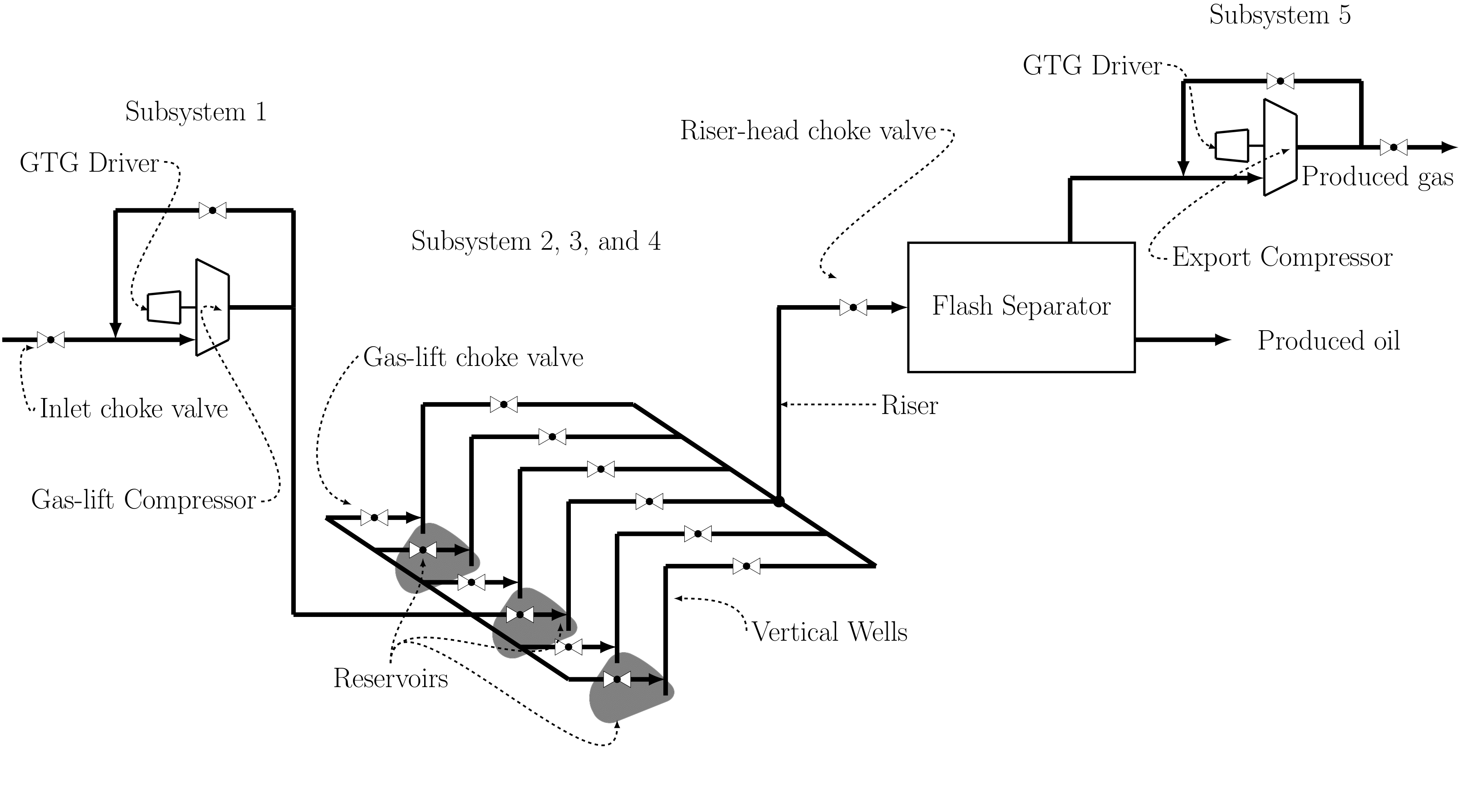(545f) Optimal Resource Allocation in a Subsea Oil Production Network Using Distributed Feedback-Optimizing Control Based on Primal Decomposition
AIChE Annual Meeting
2022
2022 Annual Meeting
Computing and Systems Technology Division
Networked, Decentralized, and Distributed Control
Wednesday, November 16, 2022 - 5:05pm to 5:24pm
Distributed real-time optimization (RTO) using the dual (Lagrangian) decomposition approach is a common approach to decompose a large-scale optimization problem [1], where the different subproblems are locally optimized for a given shadow price of the shared constraint, which is updated by a central coordinator. In the traditional distributed RTO approach, this involves solving numerical optimization problems online for each subproblem iteratively, which can be computationally intensive. In order to avoid the need for solving numerical optimization problems, a distributed feedback-based real-time optimization (DFRTO) framework was recently introduced in [2] and applied in a large-scale subsea oil production system [3], where each subproblem is locally optimized for a given shadow price using feedback controllers, and the coupling constraints are controlled using the shadow prices in the slow time scale. This structure can be a limiting factor if the coupling constraints are hard constraints.
In order to address this issue, this work considers a distributed feedback-based RTO scheme based on primal decomposition that ensures primal feasibility [4]. As opposed to dual decomposition, where the shadow prices are given by the central coordinator, in primal decomposition, the different subproblems report the price they are willing to pay for the shared resource/constraint, and the central coordinator directly allocates the shared resource/constraint accordingly. Based on this idea, we propose an optimizing control structure, where the local shadow prices from each subsystem are estimated using the gradients estimator locally. By controlling the constraints to a limit based on the allocation set by the central coordinator, and reporting the estimated shadow prices back to the central coordinator, we show that we can achieve optimal resource allocation using feedback controllers.
We apply the proposed approach on a large-scale subsea gas-lifted oil production well network, consisting of several clusters, each operated by different working groups [5]. We use a model-based gradient estimation scheme to estimate the local shadow price and use simple feedback controllers in each subsystem to achieve asymptotic optimal operation. The simulation results are compared with centralized model-based RTO and DFRTO [2,3].
References
- Wenzel, S., Paulen, R., Stojanovski, G., Kramer, S., Beisheim, B., and Engell, S. (2016). Optimal resource allocation in industrial complexes by distributed optimization and dynamic pricing. Automatisierungtechnik, 64(6), 428-442.
- Krishnamoorthy, D. (2020). A distributed feedback-based online process optimization framework for optimal resource sharing. Journal of Process Control, 97, 72-83.
- Dirza, R., Skogestad, S., Krishnamoorthy, D. (2021). Optimal Resource Allocation using Distributed Feedback-based Real-time Optimization. IFAC-PapersOnLine vol. 54 (3).
- Dirza, R., Skogestad, S., Krishnamoorthy, D. (2022). Distributed Feedback-optimizing Control based on Primal Decomposition (in preparation).
- Dirza, R., Rizwan, Md., Skogestad, S., Krishnamoorthy, D. (2022). Real-time Optimal Resource Allocation using Online Primal Decomposition. IFAC MMM 2022 (accepted).

